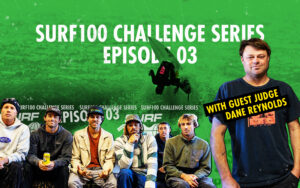The Stab Interview: Actor Jeffrey Wright
The Oscar nominee for “American Fiction” on what Hollywood can learn from surf films, why Shakespeare still matters, and meeting JJF while filming The Hunger Games.
“I have to surf before every award show,” Jeffrey told me, “it helps me calm down.”
“Calm” is an encompassing word to describe Jeffrey Wright. “Just super cruise-y, all style,” is how surf buddy Luke Hemsworth describes Jeffrey’s amphibious MO. “At first, it was like watching a baby giraffe learn to walk, it was cute!” joked Hemsworth, “but he’s actually progressed faster than anyone I’ve ever seen.”
Not all Stab readers have heard of Jeffrey Wright, but we’ve nearly all seen him in the abundance of mainstream series and films he’s starred in over the years — and as a three-year Stab Premium member, he’s been among us too.
We’ll save you a Google: Jeffrey’s been in three James Bond movies, three Hunger Games, one Batman, two Wes Anderson films, HBO’s Westworld, and, most recently, American Fiction, where his role as the film’s leading man had him bowtie-clad last month at the Academy Awards where he was nominated for an Oscar for Best Actor.
Jeffrey got his first bite of the bug in 2012 when he surfed in Hawaii with his two kids. And it was during his time shooting Westworld for four seasons where Jeffrey began driving an hour through traffic to squeeze in surfs after shooting, and later when he rented a “surf shack” in Malibu and began carpooling and surfing religiously with his co-star Luke Hemsworth.
A bookish, quick-witted Poli Sci major who dropped out of NYU’s graduate acting program to join a “Shakespeare in the Park” company over 30 years ago, Jeffrey is equally effective in arthouse Wes Anderson films and big, popcorn-smacking movies alike. He lends his characters an air of cerebrality that grounds and elevates the production, even in young adult kiss-and-kill-athons like Hunger Games.
“I don’t think you can act intelligence. I think it’s a quality, it’s a feeling,” said one director. “There’s a ferocity of how the brain works, and some people who are very smart are not necessarily able to embody that intelligence in their work. Jeffrey, I think, is very rare in that. I don’t think he acts intelligence, I think he just embodies it.”

In the words of Jeffrey’s friend and acclaimed director George C. Wolfe, “I’m glad that, over time, people don’t want to just have him cast as ‘noble Negro in the corner saying smart things,’ because his range and his versatility are so exciting and so expansive,” he says, “I’m glad that the roles he’s being given are becoming more and more exciting and more dangerous and more interesting.”
We recently Zoomed Jeffrey to talk about American Fiction, his surfing life, and Hollywood’s oddities. We ended up talking about preparing for the biggest award show in the world, getting into arguments at First Point, being coached by “Buttons” Kaluhiokalani, and why humans never change.
Jeffrey was sharp, quick to laugh, and gracious, even for our niche surfing publication.
Stab: During one of the saddest scenes of American Fiction, I couldn’t help but notice a surfable righthand point in the background, did you surf it?
Jeffrey Wright: [Laughs] Yes, that’s a sort of secret spot in Massachusetts, where we filmed that scene. I didn’t have time to surf it, but the producers knew if the waves got any better I was gonna start scrambling.
Has proximity to waves ever influenced your decision to work on a movie or not?
I think it does. The most recent Bond film was filmed in Jamaica, and I surfed almost every day at Boston Bay there. And it was actually when we went for the first time to make The Hunger Games in Hawaii that I surfed Chun’s a few times. But it was really during Westworld where I was in one place for a while and surfed every single day that I could.
What can surf filmmakers learn from Hollywood?
I think it’s actually the other way around. I think Hollywood filmmakers can actually learn from surf filmmakers. Surf filmmakers make something so wild feel so intimate with water angles and drone angles and I think some surf cinematography is just as good as what’s being done in movies.
Who are your favorite surfers that you like to watch and learn from?
I don’t think I’m good enough to learn from them, but I once met John John in the dark one morning at Sunset. I had to be on set for Hunger Games at 8 am, but the Triple Crown was happening so I woke up early, rode my bike to Sunset, and this blonde-haired kid was already getting out of the water. He shot me a kind smile and an innocent wave and just seemed like a good kid. I later found out that it was John John, and I’ve actually seen him since — I took my kids to the premiere of his movie in Brooklyn and they were able to meet him too. I really love his surfing.
Whatever the hell Kai Lenny is doing is crazy. That dude is an alien to me. He’s doing such radical stuff in such extreme circumstances.
And I also got a lot of inspiration from Billy Kemper and that series with him recovering from his injuries as I’ve had a few injuries of my own. I try to draw out of all different kinds of sources, and it’s not always other actors.

Tell me about meeting Buttons.
It was during that time I was surfing Chun’s. There he was, looking like Neptune, and I was out there just kooking it. We talked for a while and just vibed, but I didn’t know who he was. Then, I told my friends about this dude I met who was really cool out in the water and I described and they’re like, ‘That’s Buttons!”
So, when I returned a few months later to finish shooting Hunger Games, I researched him and sought him out. There’s not too many guys in surfing that look like me — Buttons was half-Black, half-Hawaiian and I wanted to learn about his story and even considered making a documentary about him. In the end, I took some lessons from him and we just vibed and became friends. He was a humble man that I think he felt overlooked by the surfing world at the end of his life. He passed away before I could take my kids to surf with him. I’ll always remember him telling me, “Let the water come to you, brother J.” [laughs]
You came to surfing as an adult with fully formed but fresh eyes, I’m curious what about surf culture you like and dislike.
I started really getting into surfing at First Point, Malibu. And I felt a real sense of community there. It seemed like everyone was going out in the water to get away from something on land, and that made them feel like kindred spirits to me. The water centers and revitalizes me and gets me away from the land to just find some fleeting peace alone. When you go back on land, you just feel better prepared to figure things out.
That being said, the only thing I don’t like is that weird sense of proprietary entitlement. That stuff is fucking weird. There have been times I’ve gotten into it with people. I’ve tried to evolve over time and not be so volatile, but some people want to direct some of that energy toward you in the water, and I’m certainly willing to give it back [laughs]. I come from Southeast D.C. after all, that’s the way I was programmed. There can be a weird sullenness in the water sometimes. But, for the most part people have accepted me graciously.
Here’s a left field question — you started as a Shakespearean actor, what is it about Shakespeare that makes it endure as the foundation of acting?
The language is complex, challenging, powerful, beautiful, and lyrical. There’s wonderful layers to it — it’s energized with hidden meaning and it takes detective work to mine everything out of it. But when you do mine down and strip out the reverence for it and make it your own, that’s where the magic comes from.
And the stories are relevant because people don’t change. COVID taught me that — look at the pandemic of 1791 and the Spanish Flu pandemic, we face the same challenges now and we forget we’ve faced them before. You can read a story from thousands of years ago and it’s still relevant because we’re still the same fucking people.
With American Fiction, yes the movie is about race and all that, but it’s really about universal themes like grief and family and forgiveness. When I read the script, I saw myself in the character, Monk, and that’s what got me excited. I saw echoes of my personal life in him.

A lot of people start surfing and then quickly quit. What captivated you enough to keep going?
Yeah, when I first took lessons in Hawaii it was hard. I would paddle 15 strokes and just feel exhausted. But I come from a long history of saltwater. My grandpa was an oysterman, a fisherman, sold homemade whiskey, and played in the Negro Leagues as a pitcher. He was quite the man. I spent every summer at my grandparents’ house in Virginia Beach bodysurfing, and the beach became my favorite place.
I’ve also been skating since I was nine years old. I lived on a hill and would do a lot of hill bombing and then transitioned to making ramps out of old wood lying around the house. I started reading Skateboarder Magazine and seeing names like Tony Alva and Larry Bertleman and being aware of California and the scene there. Then, I broke my leg skating a bowl when I was 14 the first week of summer, couldn’t play football, and decided to quit the board.
Surfing combined these two old loves and maybe that’s why I love it so much. The water resets my system.
Sometimes, when I get out of my truck, and the water’s warm, and I’m just in trunks, and I’m walking down to the beach, I think: “Is this all I need?”













Comments
Comments are a Stab Premium feature. Gotta join to talk shop.
Already a member? Sign In
Want to join? Sign Up